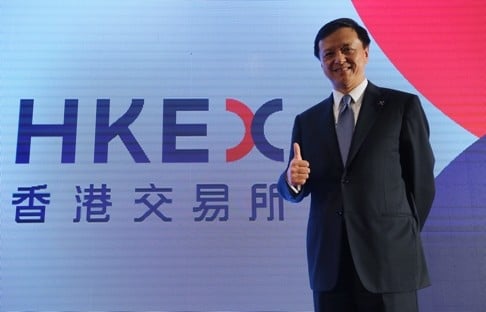
Hong Kong stock exchange operator eyes more trading links with China
Hong Kong Exchanges and Clearing (HKEx) is weighing a third board, introducing cross-border initial public offering (IPO) and launch a new commodities platform in Shenzhen in the next three years, said chief executive Charles Li Xiaojia.
Unveiling the exchange operator’s three-year strategic plan and its new logo in a media briefing on Thursday, Li said HKEx is focusing on expanding the “connect” schemes between Hong Kong and mainland China, a priority that is reflected in the new logo.
“The Shenzhen stock connect scheme will come next. There are no concrete plans for other connect schemes but we plan to build up many of these as bridges to connect China with international investors and to help mainland investors invest in international products in Hong Kong,” he said.
Among the list of new connects will be a primary equity connect, or IPO connect, to allow mainlanders subscribe to Hong Kong IPO and international investors subscribe to mainland IPO.
READ MORE: Local brokerages don’t have much to cheer about as stock connect celebrates its first anniversary
“That will attract many international firms to list in Hong Kong to capture the mainland investor base,” he said.
Another plan to boost new listings is the third board to attract innovative companies to the city.
“Some have urged us to lower the listing requirements to attract innovative companies to list here. Some want us to raise the bar to keep out bad companies. These conflicting views make it hard to change the existing market. A new board may allow us to have new rules for new companies to raise funds. But this is my idea. The Securities and Futures Commission (SFC) will make the decision,” he said.
The SFC had opposed the idea of allowing Alibaba Group to list in Hong Kong with a share structure that would allow the top management of the e-commerce giant to nominate the majority of the board even with a minority stake. Alibaba eventually listed in New York in 2014 in a mega fundraising, prompting the city to review its listing rules.
Li also plans a commodities platform in Shenzhen. “This would allow mainlanders to trade LME products in China,” he said, without providing a timetable.
The proposed bourse will tie up with commodities exchanges in Hong Kong and London, and maybe other mainland commodities exchanges in the long run.
HKEx bought the London Metal Exchange, the world’s largest, in 2012 as the first step towards expanding into commodities and reduce its reliance on equities. Three years on, HKEx has launched six metal products in Hong Kong but only a few of them are trading.

Li said the tie-up would bring LME products to Hong Kong to make it easier for mainland investors to trade here.
The next step in cross-border financial integration would be to introduce a bond connect and a derivatives connect, said Li, adding HKEx would also seek to improve the one-year old stock connect between Hong Kong and Shanghai.
Hong Kong linked up with Shanghai in November 2014 in the first cross-border trading scheme, giving international investors access to Shanghai-listed shares via Hong Kong brokers. Mainland investors with 500,000 yuan (HK$592,000) in their securities accounts were similarly allowed to trade Hong Kong stocks through mainland brokers.
A similar Shenzhen-Hong Kong scheme was originally planned to be launched by the end of last year but was delayed by the last summer’s market rout in China. No new timetable has been announced for the proposed scheme.
HKEx is also focusing on yuan products, with the exchange operator keen to increase its offerings to meet the needs of international traders seeking to hedge currency risks.
He said the present volatility in the stock and currency markets would not affect the exchange’s expansion plans.
“We are offering the products to investors who need them, not because the markets are good,” he said.

